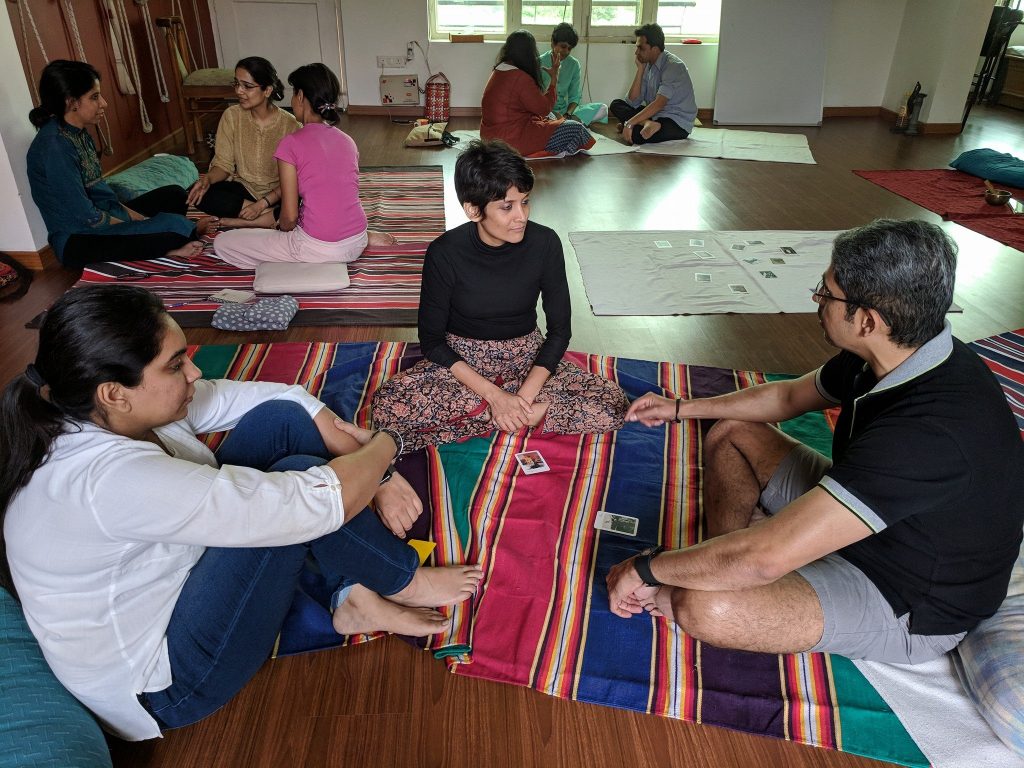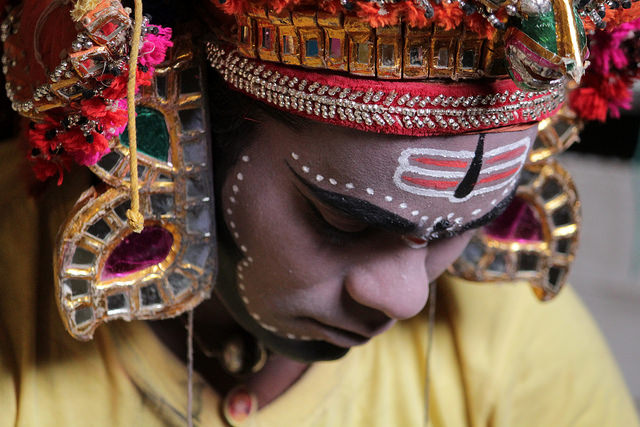
“Between stimulus and response there is a space.
In that space is the ability to choose our response.
In our response lies our growth and our freedom.”
Viktor E. Frankl.
The 5 Seats of Power workshop evolved from the program Mahabharata Immersion. The MI, as it is often called, is a powerful exploration into the self through the perspective offered by the Mahabharata. This Itihasa Purana is not just a tale of events of a bygone era, it is a framework through which one can observe and analyse the human experience of life.
Apoorva Gupta Jalan, one of the facilitators of the 5 Seats of Power, finds the Mahabharata to be a powerful tool for everyone, whether they are familiar with the stories or not.
“There is something eternal about the Mahabharata; it deals with all aspects of our life. You have instances of love and betrayal, duty and responsibility, family, property… These are aspects that we all can relate to. The stories are a way for us to see ourselves in these events from a detached perspective, and they also allow us to envision other possible reactions and outcomes.
The 5 Seats of Power workshop is a way to begin that exploration of the self. It gives people a taste of that process of self reflection and observation and introduces the concept of the 5 energy sources within all of us; the Pancha Pandava.”
The 5 Seats of Power – The Pancha Pandava
According to Raghu Ananthanarayan, who designed the MI program and the Pandava Profile, there exists within each individual 5 types of energy sources which can be equated to each of the 5 Pandavas. These energies have their qualities and characteristics, as well as their shadow natures. As humans, we often take action or experience emotions in unique manners, yet upon closer observation, we can begin to see these patterns reflected in the characteristics of each of the 5 Pandavas from the Mahabharata.
A Bhima, for example, relies heavily upon action and high emotion, while a Yudhistra relies more upon socially accepted and established norms, and values duty and order above all else. A Nakula can be considered as a care-giver and nurturer, while a Sahadeva is more analytical and research-oriented. The capacity to ask pertinent and uncomfortable questions, and to enquire into one’s self is characteristic of an Arjuna.
“The way I see it,” elaborates Apoorva, “we all act from these spaces during our daily lives, but most of us are unaware of it. We also don’t often see that there are many ways of action and being in each situation.
When we begin to observe these 5 Seats within ourselves, we not only see our actions as emerging from these seats, we also begin to see how we may be limiting ourselves by singularily focusing on one particular mode of action or reaction.
“For example, one of the participants who has been with us in this exploration for awhile, shared with me her experience. When she first explored the 5 Seats, she realised that she encompassed many Yudhistra qualities. While this had helped her in many situations, she also observed that, in many instances, she lacked the Bhima quality of action and initiative. Just by this observation, she was able to make many changes in her life, both professional and personal.”
A Process of Reflection and Engagement
How do such workshops unfold? What are participants expected to do? Apoorva reveals that the design of the workshop evolves regularly, but the basic process is one of reflection, sharing, and engagement with the stories. By entering into this process, participants can then begin to explore other possibilities of thought, behaviour, and response in their own life scenarios.
 “What fascinates me most about this workshop is when people begin to tell their stories, and you get to see the connections that exist with this larger frame of the Mahabharata. I’ve worked with many clients individually as a yoga therapist and coach, but this process of observing oneself through these characters of the Mahabharata is extremely powerful and insightful.”
“What fascinates me most about this workshop is when people begin to tell their stories, and you get to see the connections that exist with this larger frame of the Mahabharata. I’ve worked with many clients individually as a yoga therapist and coach, but this process of observing oneself through these characters of the Mahabharata is extremely powerful and insightful.”
A New Take on An Ancient Story
Does the religious overtone of the epic make it difficult for people to access the learning? Apoorva believes not. “It’s really in the hands of the individual. We don’t see the Mahabharata as a religious text, but as an Itihasa Purana (old, yet nascent tale). If you can approach the stories openly, I believe that they are for everyone. At our previous MI, we had one participant from Israel. The experience was extremely powerful for her, as it has been for many others. Likewise, I don’t believe that one’s career or background prevent one from experiencing the benefits of this process. We have had homemakers and corporate professionals participate, with everyone gaining some valuable insights into themselves. It’s really about bringing it back to the person.
“In many corporate leadership or self development programs, the emphasis has always been on the takeaway. “How can I get my team to do this? What are the things I need to get done?” What we encourage people to do is to turn those questions inwards. Through this work, you begin to ask yourself “How do I act in this situation? What is it in me that moves me so? What are the other avenues open to me?”
“It truly doesn’t matter what one’s circumstances have been; in the end, we are all human after all. And working with the 5 Seats allows each of us to enhance, moderate, and balance these energies and tensions within ourselves, so that we can live the lives we truly wish to live, honestly and from a position of personal power.”
If you would like to experience the 5 Seats of Power, contact ashram@ritambhara.org for details on the next available workshop. You can also make a request to host such an event in your city or workplace.


 Anoop is a student of Yoga, an entrepreneur, a coach and a father of two young boys. He has led successful leadership stints in both the corporate and non-for-profit sectors. On encountering the country’s water/farmer crises at close quarters, he decided to pause and examine the impact various ‘isms’ – capitalism, colonialism, etc., were having on us as individuals, families, the society and the environment at large. This quest led him to formally engage with traditional Indic knowledge systems while also learning from the latest advances in science – about our physical and mental wellbeing, importance of body and mind work in healing trauma and the urgent need for a conscious rebuilding of family / work / social structures if we have to thrive individually and collectively. Insights, frameworks and processes gleaned from these on-going studies, an anchorage in his own personal practice and his wide-ranging experiences is what Anoop brings to facilitation/coaching spaces in Ritambhara and his various professional engagements.
Anoop is a student of Yoga, an entrepreneur, a coach and a father of two young boys. He has led successful leadership stints in both the corporate and non-for-profit sectors. On encountering the country’s water/farmer crises at close quarters, he decided to pause and examine the impact various ‘isms’ – capitalism, colonialism, etc., were having on us as individuals, families, the society and the environment at large. This quest led him to formally engage with traditional Indic knowledge systems while also learning from the latest advances in science – about our physical and mental wellbeing, importance of body and mind work in healing trauma and the urgent need for a conscious rebuilding of family / work / social structures if we have to thrive individually and collectively. Insights, frameworks and processes gleaned from these on-going studies, an anchorage in his own personal practice and his wide-ranging experiences is what Anoop brings to facilitation/coaching spaces in Ritambhara and his various professional engagements.
 Priya is a Yoga therapist in the Krishnamacharya tradition. She adapts Reiki & energy work, Vedic chanting, life coaching & Ayurvedic practices in her healing spaces. She is committed to nurturing collectives that have the praxis of Yoga at their heart.
Priya is a Yoga therapist in the Krishnamacharya tradition. She adapts Reiki & energy work, Vedic chanting, life coaching & Ayurvedic practices in her healing spaces. She is committed to nurturing collectives that have the praxis of Yoga at their heart. Anisha has been on an exploration to understand herself through yoga for the last 15years which led her to teaching yoga, yoga therapy and inner work through yoga.
Anisha has been on an exploration to understand herself through yoga for the last 15years which led her to teaching yoga, yoga therapy and inner work through yoga. Apoorva chanced upon Yoga in her early 20s. A spark was lit within and there was no turning back. Her exploration led her to the Krishnamacharya tradition more than a decade ago. Curious about human behaviour and what drives it, she was thrilled when her search ended (and also began) when she first came upon the Yoga Sutra, which illuminated a path towards answering many questions that had been held for a long time.
Apoorva chanced upon Yoga in her early 20s. A spark was lit within and there was no turning back. Her exploration led her to the Krishnamacharya tradition more than a decade ago. Curious about human behaviour and what drives it, she was thrilled when her search ended (and also began) when she first came upon the Yoga Sutra, which illuminated a path towards answering many questions that had been held for a long time. Anita is a yoga teacher and therapist in the tradition of Sri.T.Krishnamacarya and Sri T.K.V. Desikachar, a Reiki practitioner and a Life Coach. She is also the founder of Vishoka, a center for learning Indic and energy-based frameworks for living and healing. Her deep concern for human suffering and the problems of unsustainable living kept her on the path of seeking an integrated approach to looking at life, living, learning and healing.
Anita is a yoga teacher and therapist in the tradition of Sri.T.Krishnamacarya and Sri T.K.V. Desikachar, a Reiki practitioner and a Life Coach. She is also the founder of Vishoka, a center for learning Indic and energy-based frameworks for living and healing. Her deep concern for human suffering and the problems of unsustainable living kept her on the path of seeking an integrated approach to looking at life, living, learning and healing. Ankit is a seeker in the wisdom traditions of India. The core of his work includes creating dialogic spaces where people can look within and see the connection between their inner and outer lives. Inspired by the likes of Gandhi, Aurobindo, Vivekananda and Guru Gobind his experiments in service took him back to his roots in Punjab where he is creating a community-led model of higher education which is open, inclusive and accessible for all. Ritambhara for him is a space for engaging in a community which is committed to a DHramic life. He anchors his work of learning and leadership in the Antaranga Yoga Sadhana and the humanistic wisdom of Mahabharata.
Ankit is a seeker in the wisdom traditions of India. The core of his work includes creating dialogic spaces where people can look within and see the connection between their inner and outer lives. Inspired by the likes of Gandhi, Aurobindo, Vivekananda and Guru Gobind his experiments in service took him back to his roots in Punjab where he is creating a community-led model of higher education which is open, inclusive and accessible for all. Ritambhara for him is a space for engaging in a community which is committed to a DHramic life. He anchors his work of learning and leadership in the Antaranga Yoga Sadhana and the humanistic wisdom of Mahabharata.